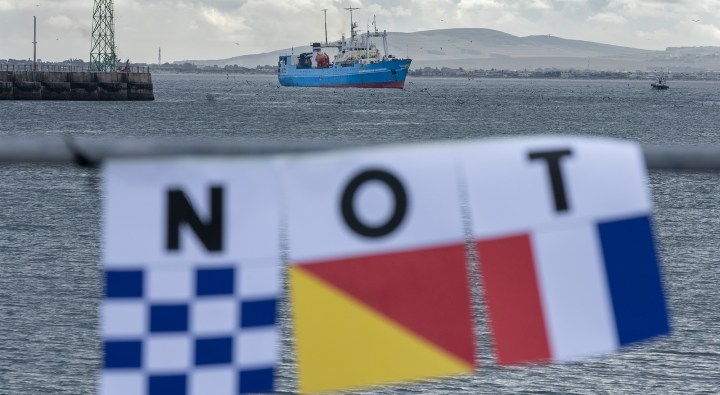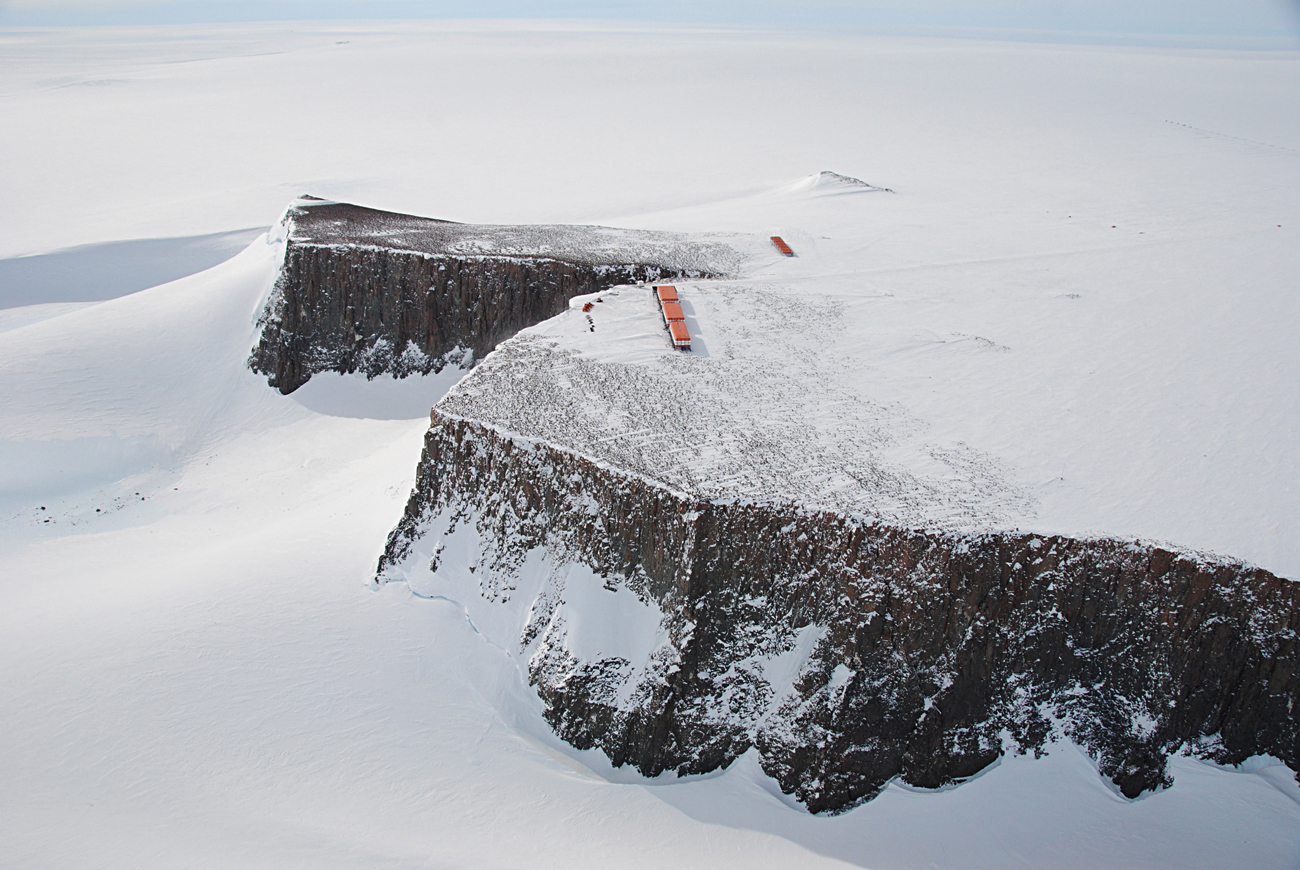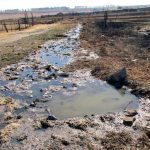POLAR POLITICS
Parly gaffes, inconsistencies cast shadows on SA official’s denials of Russian ‘prospecting’ in Antarctica

Democratic Alliance (DA) opposition members have grilled South Africa’s head of oceans and coasts about the Kremlin’s Cape Town-launched mineral missions into Antarctica — but Dr Lisolomzi Fikizolo, in a Parliament briefing, has said that Russia’s activities have nothing to do with the country. While tuning his compass, the official seemed to find a talent for getting lost: mistakenly insisting — twice — that Australia’s icy empire covers ‘about more than 60% of Antarctica’.
Dr Lisolomzi Fikizolo, South Africa’s top polar official, faced scrutiny during a briefing to Parliament’s environment committee on the country’s Antarctic operations — with Russia’s ship-based minerals “research” sorties through the Mother City stealing the show.
The Russian forays into Antarctica and the Southern Ocean are controversial due to potential exploitation concerns once the current mining ban, which has no expiry date, can be changed or lifted from 2048. This minerals “narrative”, however, was devoid of evidence, Fikizolo held firm in the June briefing, which has not been previously reported. South Africa had to allow “innocent passage” to Russian state ships “from the UN point of view”, he contended.
South Africa, one among 29 decision-making states to the 1959 Antarctic Treaty, helps manage the Antarctic for demilitarised aims such as research and tourism, where heatwaves and this year’s unusually low sea ice have puzzled scientists. For instance, around 9,000 emperor penguin chicks from Bellingshausen Sea colonies are believed to have perished in November 2022.
You’ve heard about Antarctic sea ice lows – well, here’s the consequences.
Over 9,000 emperor penguin chicks from colonies in the Bellingshausen Sea are thought to have died in November 2022.
The sea ice they lived on broke up early, before they’d developed waterproof feathers. pic.twitter.com/0A4J3as44a
— British Antarctic Survey 🐧 (@BAS_News) August 24, 2023
As oceans and coasts head of the sole African decision-making state, Fikizolo is, therefore, Africa’s top polar official, and apparently tried sticking to a safe script during his presentation. South Africa maintained an East Antarctic research station and was committed to preserving the region’s unique character, he said. He had reaffirmed Antarctica’s decades-old mining ban alongside other decision-making states, including Russia, during the annual Antarctic Treaty meeting in May and June, hosted in Helsinki.
According to the ban, “any activity relating to mineral resources, other than scientific research, shall be prohibited”. Fikizolo said that extracting minerals would remain verboten, and “there is not going to be any mining research that is going to be allowed”.
Suggesting an investigation was necessary, DA committee members interrogated Fikizolo’s claims — such as that South Africa lacked access to evidence on the Russian activities.
“It has been allegations with no evidence,” Fikizolo said — although prominent Antarctic governance academia have disagreed, saying the “evidence” for “prospecting” is “clear”.
These annual Russian missions have been carried out via Cape Town aboard an airgunned seismic ship belonging to the Kremlin’s minerals explorer, Rosgeo, even after the ban entered into force in 1998 under the Madrid Protocol, the treaty’s environmental constitution. The ban was signed in 1991.
Daily Maverick has reported on the ship’s movements, and its findings, since October 2021. And, ironically, despite Fikizolo’s own denials, Russia has not made a secret of its minerals investigations in the environmentally sensitive polar region. Instead, Rosgeo has contended that the activities conform to the ban’s scientific “research” allowances. However, while early-stage resource prospecting is argued to be outlawed, and the line between prospecting and “scientific research” may seem obvious, the ban’s lack of clear definitions remains a topic of debate.
In 2021, Rosgeo offered a substantive response, insisting that the exploration company and its subsidiary were interested only in non-commercial scientific inquiry and preserving the Antarctic as a ‘nature reserve for peace and science’.
Yet, concerns hardly relate only to oil and gas.
Rosgeo may have made unproven claims that there are 500 billion barrels of oil and gas (15 times global annual oil consumption) beneath the Southern Ocean, but online reports by the company’s subsidiary also describe a substantial inventory of minerals along 2.5 million km² of the East Antarctic’s Indian Ocean sector. From 2007 to 2017, for instance, Russian geologists have assessed potential so-called “raw materials” here — including gold, diamonds, copper-nickel, coal, iron ore, molybdenum and uranium.
As Russian academia have also told us, there is a “real” possibility that other countries are prospecting continental Antarctica. Yet, in 2016, the Rosgeo subsidiary openly claimed credit for the “overwhelming majority” of work needed to identify Antarctica’s potential supergiant oil fields.
‘Allegations’ — predetermined as ‘false’?
Responding to Fikizolo, DA committee member Hannah Winkler hit back. Would the national environment department, which employs Fikizolo, launch its “own investigation into [the Russian activities] to decide if there is any veracity to the claims?”
“What sort of evidence is the South African government actually looking for?” Winkler asked. “Or have you already decided as a department in conjunction with the minister that the allegations are false?”
ANC, EFF and IFP members were also present in the briefing, but their enquiries focused on South Africa’s general Antarctic operations.
Fikizolo vs NGOs, peer-reviewed academia
The department’s communications office has previously defended Russia’s actions as “freedom of scientific investigation” — a treaty cornerstone used by Japan for controversial, but currently suspended, “scientific” hunting for commercially sold whale meat.
And now Fikizolo insisted he had not received evidence from 29 South African NGOs, even though they had sent a letter earlier this year urging the government to stop the Rosgeo ship due to, among others, peer-reviewed concerns about airgun surveys potentially harming penguins, whales and other marine life.
The letter’s signatories, led by Extinction Rebellion Cape Town and Greenpeace volunteers, also quoted peer-reviewed research on “Russian Antarctic minerals prospecting activity”. Among the signatories is the influential Green Connection, whose co-founder Liz McDaid played a crucial role in overturning South Africa’s $76-billion nuclear deal with Russia in 2017. These non-profits do not enjoy access to Antarctic Treaty meetings, but this year their local protests have gained attention from news media around the world.
In the past two years alone, a growing list of peer-reviewed academic publications have also flagged Cape Town as a launchpad for the contentious surveys — including a June 2023 report commissioned by the European Parliament (as well as here, here, here and here).
“South Africa has a moral duty on behalf of its own citizens, Africa and the whole world to not enable this kind of activity in an area that is very ecologically sensitive,” said Greenpeace campaigner Elaine Nills. https://t.co/o51UnFWBy6
— The Moscow Times (@MoscowTimes) January 29, 2023
Stalemate: ‘No evidence, no investigation’
Fikizolo persisted: He was “not sure where the origins of that narrative come from … precisely because” the evidence had not been tabled at the Antarctic Treaty Consultative Meeting (ATCM), the mid-year event where the big annual decisions are made.
No investigation could be launched without receipt of supporting facts, he said, but Daily Maverick had already repeatedly supplied the department, the Antarctic Treaty Secretariat and the treaty’s Committee for Environmental Protection — which advises the ATCM — with publicly reported facts, to which they did not respond or declined to respond.
Outside the Helsinki ATCM venue in June, Fikizolo had also declined this reporter’s in-person interview request, referring us to the department’s spokespeople instead.
“Due to the concern and gravity around these allegations,” the DA’s Winkler concluded, “saying that you don’t think something is happening” is not “substantial enough” to disregard the need for further investigation.
‘Non-alignment’: diplomatic tango in iceberg alley
Did hosting the Kremlin’s seismic activities also create the perception that South Africa was helping Russia adhere to illegal activities in Antarctica, asked DA committee member Annerie Weber.
At least, they raise questions about the ANC government’s “non-alignment” policy towards Russia’s war against Ukraine — a policy that, in theory, applies to the Antarctic regions as well.
For instance, Cape Town continues to host Russian state polar ships every year (something the city’s DA-affiliated mayor, Geordin Hill-Lewis, is not happy about). But then, Ukraine’s Noosfera polar research vessel has been in the city since the start of the war, seeking refuge in the Table Bay port when not in Antarctica.
In closed-door Antarctic meetings, Fikizolo and his colleagues have sometimes aligned with Russia. At the most recent Helsinki ATCM, his delegation and BRICS allies Brazil, China and Russia did not co-sponsor a more ambitious mining ban reaffirmation, in contrast to other Western and Western-aligned states, such as Ukraine. At the same ATCM, Russia’s and Fikizolo’s delegations sat together due to alphabetical arrangements, refraining from joining a resounding ovation for a climate youth activist — in sharp contrast to the lion’s share of the decision-making states.
A non-binding declaration coming out of Helsinki would eventually include a clause to reaffirm the ban. Nevertheless, it was watered down.
In any number of mid-century scenarios, no one might care about mining Antarctica. The ban then continues as normal. And while some senior Russian academia involved in Antarctic minerals research have suggested the Madrid Protocol is a “gentleman’s agreement”, Russian authorities are officially committed to sticking to the ban until at least 2048.
If, however, Moscow needed a smoking gun that the ATCM was willing to ignore actions that test Antarctic governance, Helsinki’s hurrah to reaffirm the ban — made by all states without breathing a word about Russia’s widely reported oil, gas and other minerals “research” trips — may have been it.
Russian Antarctic vessel docks in South Africa as green groups protest https://t.co/2yArXRcYAw pic.twitter.com/0I41P67hJN
— Reuters (@Reuters) January 28, 2023
Treaty secretariat’s tiny powers
South Africa would not launch an investigation because the alleged incidents did not happen within the country’s borders or exclusive economic zone, Fikizolo added. Allegations should be sent to the Antarctic Treaty Secretariat for presentation to the ATCM, he proposed.
Here, Fikizolo seems to overestimate the remit of the secretariat — a tiny administrative body in downtown Buenos Aires with a tiny staff complement whose tiny powers allow them to act only on instructions from the ATCM.
And the ATCM, a consensus-fuelled mothership, can generally only consider launching an investigation when concerns are tabled by at least one member state, such as — well — South Africa.
So, it is hard to see how Fikizolo could distance South Africa from at least tabling the matter, as Russia relies heavily on the country’s gateway facilities to reach East Antarctica, the predominant target region for the minerals surveys.
In fact, without South Africa, Russia faces difficulties reaching Antarctica through any other official gateway state: Australia, Chile and New Zealand are unlikely to offer “innocent passage” to Kremlin ships involved in protest-causing projects.
Argentina, another gateway, provides only limited support to Russia’s West Antarctic station.
Noodles, anyone?
The Antarctic and Southern Ocean Coalition (Asoc), a key non-profit environmental group instrumental in the 1970s-1990s ban campaign, has the potential to call for compliance. However, during a Daily Maverick webinar in April, it cited limited capacity, war sensitivities and a desire to protect its embedded status at ATCMs as reasons for its unlikely pursuit of the issue.
All of which seems to raise the question: does the treaty and its protocols, supposedly Antarctica’s first line of defence, have the enforcement muscle of a cooked noodle?
Or are Antarctica’s remoteness and challenging mining conditions the region’s best protection against resource interests?
By all means be concerned about certain activities as noted here and the future role of consensus within the Antarctic Treaty System (which has relevance for fisheries conservation and marine protected areas in particular): https://t.co/XbGRpPh5IQ
— Klaus Dodds (@klausdodds) October 27, 2022
Echoing the department’s previous replies to Daily Maverick, spokesperson Peter Mbelengwa stressed South Africa’s commitment to the treaty’s protection measures. Commenting on the Helsinki ATCM, Mbelengwa also urged signatory nations to work together for the Antarctic ecosystem’s long-term sustainability — which could be seen as reassuring.
Australian ‘ownership’ gaffe
But then Fikizolo took to his briefing platform again, trotting out a list of odd factoids about fundamental, freely downloadable treaty laws.
Claiming that “about nine” countries, including New Zealand and Norway, “own land in Antarctica”, he gave a special shout-out to Australia.
“About more than 60% of Antarctica,” he said, “is owned by Australia.”
In reality, nobody “owns” land in Antarctica.
Read more in Daily Maverick: Snow pas — South African official puts his foot in it by insisting Australia owns more than 60% of Antarctica
The treaty’s Article 4, the linchpin of south polar territorial politics, recognises different positions on the pre-1959 territorial claims, but parks them for the treaty’s duration — including Australia’s.
Seven, not nine, countries have asserted claims — none of which is widely recognised, and no new claims are allowed (Russia and the US reserve a basis to claim, but neither have actually made a claim). Among others, Australia’s asserted claim hovers at a well-documented 42%. To avoid territorial tensions that could spill over into other treaty matters, correct interpretation of Article 4 is vital.
Despite DA member Dave Bryant expressing doubts, Fikizolo stuck to his guns.
His evidence? The Australian Antarctic Strategy (which does not actually back him).
We reached out to the department for further answers, but no response was received by the deadline. DM




















 Become an Insider
Become an Insider
World over politicians lie,in south Africa its like close to 100 % of lies
He doesn’t understand percentages and got his doctorate from the same “listen carefully, eleventy thousand” university as the other 100% cretins employed in government where only 60% can read for meaning.